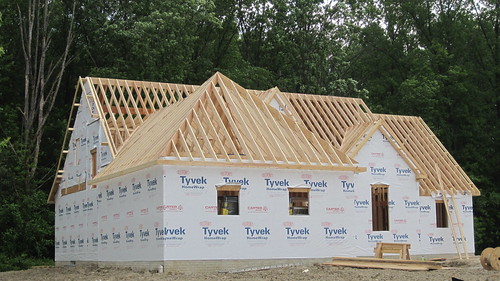 People who couldn't afford the homes they purchased are responsible for a large portion of the economic downturn of 2007 and 2008. The people who loaned them money they couldn't afford to pay back are also responsible for this important moment in world economic history. Now, lenders aren't eager to loan money to people without an established ability to repay it.
People who couldn't afford the homes they purchased are responsible for a large portion of the economic downturn of 2007 and 2008. The people who loaned them money they couldn't afford to pay back are also responsible for this important moment in world economic history. Now, lenders aren't eager to loan money to people without an established ability to repay it.
Lenders are looking at applications more carefully than ever and requiring more documentation than in the past, but that doesn't mean you can't buy a house if you have bad credit. You just have to take a different approach, usually one involving dealing with someone who doesn't care about your credit score — or taking action to improve it.
Here are some tips about how to buy a new home if you have poor credit:
Consider a rent-to-own home. Usually offered on low-end homes, rent-to-own agreements allow you to pay reasonable monthly payments that go toward the purchase price of the home. Just make sure your deal with the seller is legitimate and completely in writing because the rent-to-own home market is full of potential for scamming.
Accept that your rate will be higher. Depending on just how bad your credit is, you may not have any trouble getting a loan. But you may be offered a much higher interest rate than someone with a better credit history. Accept that, if you must, and hope you can refinance later. This will get you into a home, provide you some stability and allow you to reestablish your credit history.
Know your issues. Examine your credit report, look for errors and do everything you can to clean it up. Ask for bad or old information to be removed. Contest anything that seems at all questionable. You don't want a lender's decisions about you to be based on unfavorable information that's incorrect.
Start a program to reestablish a positive credit history. This can include taking out a secured credit card, getting a small loan from a willing bank that reports to credit agencies and other strategies for adding positive information to a bad credit report. Over time, proof of a good payment history on several cards or loans will raise your credit score.
Consider alternative routes for financing. Your parents or a friend from church won't necessarily check your credit history before loaning you some or all of the money you need to buy a home. If you have access to someone who is willing to help you buy a house, consider that source as an alternative to traditional lenders. Make sure you put all the details in writing, however, to protect all of you.
Look for a seller-financed property. If a seller is willing to carry the note for you, you may be able to negotiate a deal directly to buy a home even if you have bad credit. Individual sellers may check your credit, but because you're working one on one, you can explain the reasons for your negative credit history. Choose to work with a property owner who seems he or she may be sympathetic to your situation.
You can also try for a smaller, less expensive home. A traditional lender may be more willing to loan you a small amount of money than a large one. Ask any lender that will talk to you how much you qualify for — if anything.
When you think creatively and work to eliminate the negatives, you can buy a home with bad credit. But you may not be able to do it right away, and you may not get your target home.
Brian Talley is an Austin REALTOR® and the CEO of Regent Property Group, a boutique real estate brokerage specializing in luxury home sales and waterfront properties on Lake Austin.







